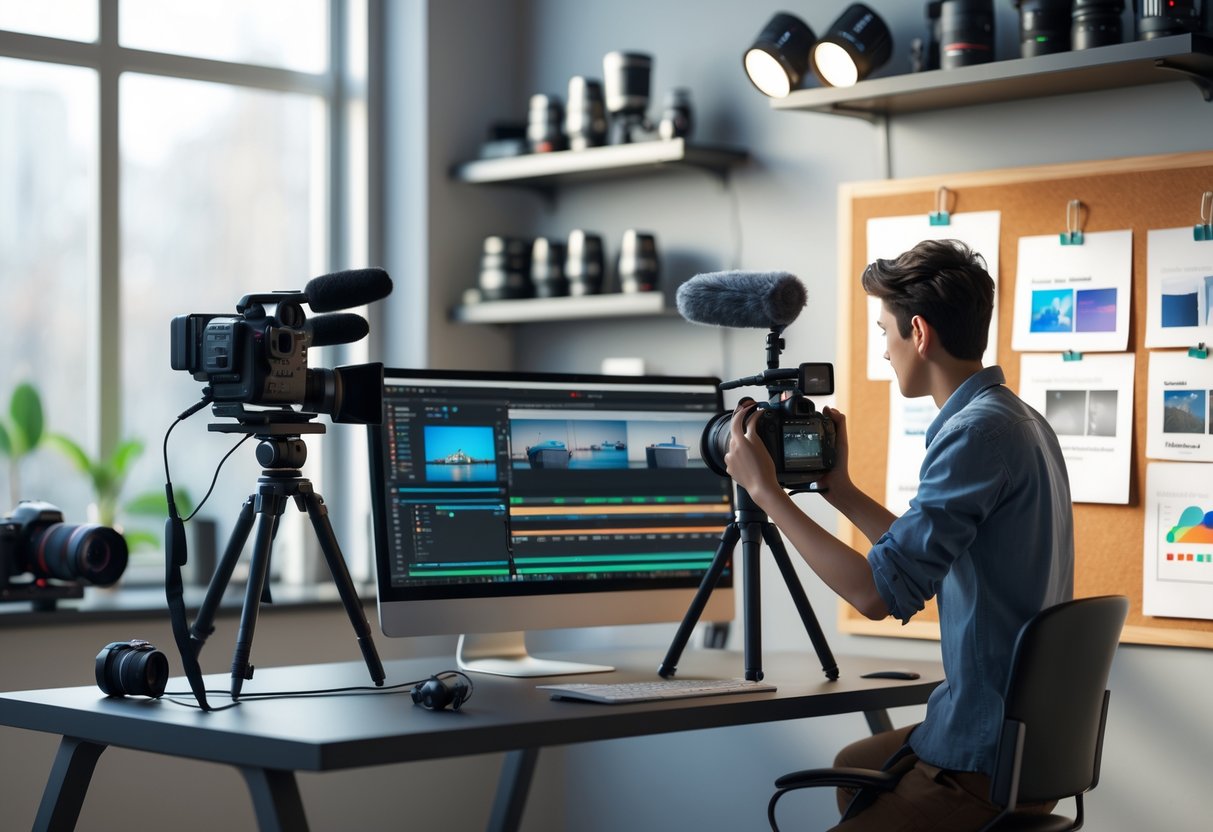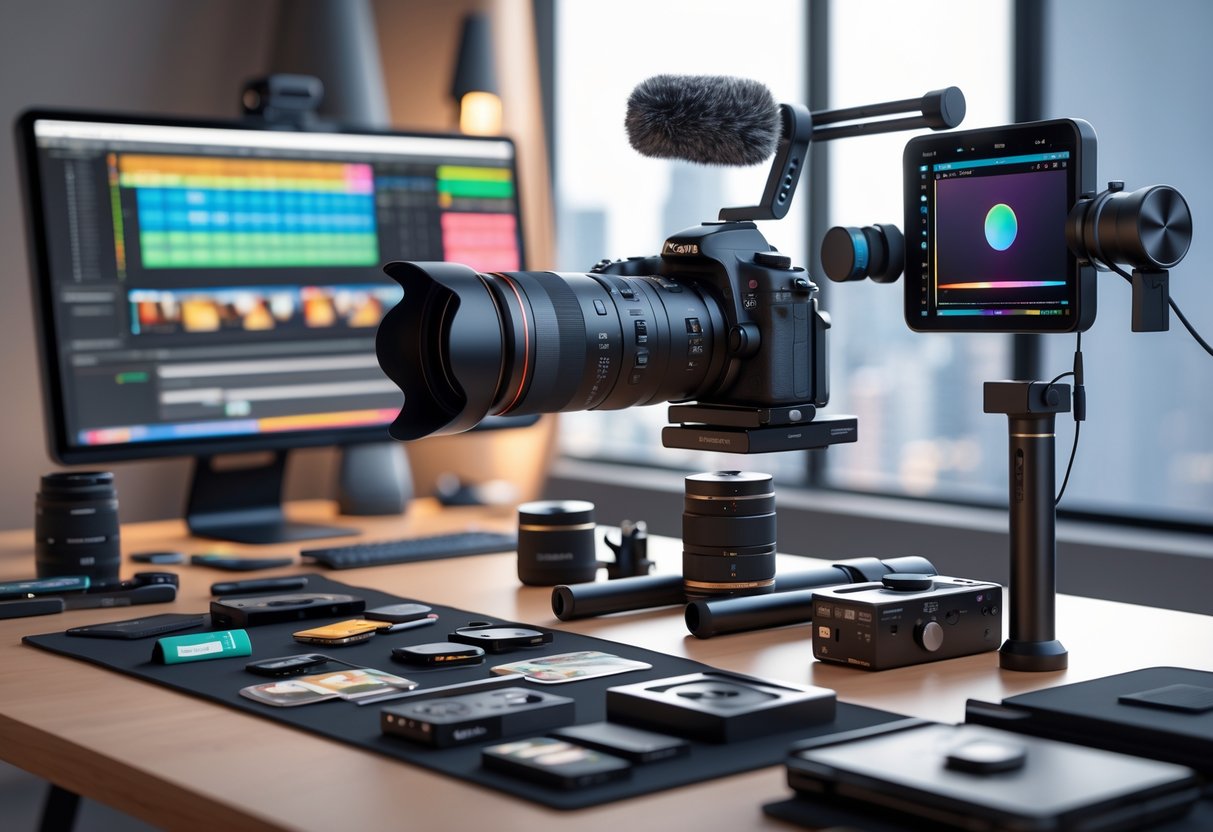Videographer Opportunities: Exploring Career Paths and Job Markets
Updated On: October 23, 2025 by Aaron Connolly
Overview of Videographer Opportunities

The videography industry covers a wide range of career options, from filming weddings to creating corporate content. Median salaries usually fall between £36,000 and £70,000 a year.
Let’s look at what videographers actually do, the skills employers care about, and which industries hire us most often.
What a Videographer Does
Videographers shoot and create video content for all sorts of clients and formats. We might film a wedding one weekend and a corporate promo the next.
Our work breaks down into three main parts. First, we plan and shoot footage with pro cameras and gear.
Then, we organise and edit everything using editing software. Finally, we team up with clients or directors to deliver the finished video.
Many of us pick a specialty. Event videographers handle weddings, parties, and celebrations. Corporate videographers focus on training videos, promos, and company docs. Broadcast videographers work with TV stations and newsrooms.
We rely on technical skills every day. We use everything from handheld cameras to drones for aerial shots.
Most editing happens on computers with software like Adobe Premiere Pro or Final Cut Pro.
Skills Employers Seek
Employers want technical know-how above all else. We need to handle digital cameras, lighting, and editing software to get the job done right.
Key technical skills:
- Camera operation and upkeep
- Mastery of editing software
- Lighting setup and tweaks
- Sound recording basics
- Troubleshooting gear
Communication matters just as much. We talk with clients, directors, and production teams to figure out what they want and make sure we deliver.
Physical stamina counts too. We carry heavy equipment, especially on location shoots. Good hand-eye coordination helps us keep shots steady on the move.
Creativity really sets us apart. Employers love when we can picture the finished video and suggest ways to improve things while filming.
Popular Industries for Videographers
Entertainment and media hire the most videographers. Film studios, TV networks, and streaming services always look for skilled people.
Top hiring industries:
| Industry | Typical Roles | Average Salary Range |
|---|---|---|
| Motion Picture/Video | Cinematographer, Editor | £55,000-£95,000 |
| Broadcasting | Studio Operator, News Videographer | £35,000-£65,000 |
| Corporate/Professional Services | Marketing Videographer, Training Content Creator | £30,000-£60,000 |
| Wedding/Events | Freelance Event Videographer | £25,000-£50,000 |
Corporate companies now put more value on video content for marketing and internal training. They hire us to make promos, training videos, and social media clips that actually grab people’s attention.
Freelancing brings a lot of opportunity too. About 34% of camera operators go self-employed, which gives us the freedom to choose projects and set our own rates while building up a solid portfolio.
Types of Videographer Roles

The videography industry really comes down to three main career paths. You’ve got freelance work, where you run your own show. In-house gigs offer steady pay and regular hours. Event specialists focus on weddings, concerts, and big gatherings.
Each path fits a different kind of personality and career goal.
Freelance Videographer
Freelancers pick their own projects and set their own schedules. You decide your rates and choose your clients.
Daily rates usually fall between £200-800 depending on your experience and the type of project. Corporate gigs tend to pay more than social media work.
The best part? Creative freedom. You get to work with all sorts of clients and build a portfolio that’s anything but boring.
A lot of freelancers stick to weddings, music videos, or promos. It’s up to you.
Downsides? Irregular income and the hustle to find steady clients. You handle everything—marketing, invoicing, equipment repairs.
Most freelancers rely on a strong online portfolio and word-of-mouth. Social media definitely helps bring in new business.
In-House Videographer
In-house videographers work for one company full-time. You might create content for marketing, training, or internal communications.
Salaries usually range from £25,000-45,000 with perks like health insurance and paid holidays. Bigger companies tend to pay more.
You focus on projects that fit the company’s brand and goals. That could mean product demos, staff training, or social media clips.
Steady pay and predictable hours are big pluses. You’ll work with the same team and get to know the company inside out.
Your employer provides the gear and software. No need to spend your own money on equipment or chase down new clients.
You can move up to video manager or creative director roles over time.
Event Videographer
Event videographers shoot live stuff—weddings, conferences, concerts, and company events. You’re always on location, adapting to new venues.
Wedding videographers can earn £800-3,000 per event depending on the package. Corporate events usually pay £300-600 per day.
You’ll need to set up fast, work in tough lighting, and nail the audio. Most of the time, you’ll work solo or with a tiny crew.
Busy seasons really impact your income. Weddings peak from May to October, while corporate events come in waves.
You’ll need more gear than most. Backup cameras, extra lenses, wireless mics, portable lights—the works.
Client relationships make or break you. Happy couples send their friends, and companies book you again if you do a solid job.
Videographer Jobs by Location

Videographer jobs can look really different depending on where you live. Big cities offer more openings, but the competition can be fierce.
Remote work now means you can find clients almost anywhere, but local demand still depends on the creative industry in your area.
United Kingdom Opportunities
London leads the UK scene. Big production companies, ad agencies, and corporate HQs all cluster there.
Key sectors:
- Corporate video for finance
- Event videography for conferences and weddings
- Content creation for digital marketing firms
Manchester and Birmingham come next. They offer lower living costs and still have plenty of jobs.
Edinburgh gets a boost during festival season. Demand spikes around cultural events.
Typical UK rates:
- Freelance: £200-500 per day
- Staff roles: £25,000-45,000 per year
- Specialist: £50,000+ in London
United States Hotspots
Los Angeles sits at the centre of it all. Hollywood means endless work in entertainment, commercials, and music videos.
New York gives you access to tons of corporate gigs. Finance and marketing companies always need video content.
Other big markets:
- Austin for tech and creative agencies
- Nashville for music industry work
- Atlanta for film production
Right now, US job boards list over 3,000 videography jobs. Salaries run from $44,000 to $100,000, depending on your experience and the city.
Remote gigs have exploded. More companies now hire videographers for one-off projects, no matter where you live.
International Job Markets
Dubai and Singapore top the list in Asia-Pacific. International businesses there always want slick video content.
Germany and Netherlands have strong demand in Europe. Berlin and Amsterdam see lots of corporate video work.
Freelance sites connect us worldwide. Upwork, for example, lists projects everywhere—even lifestyle shoots in Oslo.
Emerging markets worth watching:
- Canada – Toronto and Vancouver’s creative scenes are booming
- Australia – Sydney and Melbourne spend more on video marketing
- Scandinavia – Big budgets for corporate and tourism videos
Exchange rates can work in your favour. UK and US videographers sometimes earn more working for clients overseas.
Entry-Level Videographer Positions

Entry-level videographer jobs usually start at £15-20 an hour. Most roles come with 2-3 months of structured training.
You’ll often need 1-2 years of freelance work or relevant coursework. Companies pair you with senior videographers for mentoring.
Graduate and Student Roles
Production companies regularly hire graduates from film and media courses. These jobs help you build real-world skills to go with your degree.
New grads often start as assistant videographers or junior staff. You’ll shadow pros and learn how to use industry-standard gear.
Universities team up with local studios for work placements. These placements let you gain hands-on experience while you study.
Key requirements:
- Basic camera skills
- Familiarity with editing software
- Reliable transport for shoots
- Flexibility for evening and weekend gigs
Student internships open doors for networking. Many interns get hired full-time if they show strong service skills and technical chops.
Trainee Videographer Jobs
Trainee programmes give you the most in-depth intro to the field. Companies like Vanilla Video offer 2-3 month training periods with clear paths to move up.
Training covers:
- Multi-camera shoots
- Client communication
- Post-production basics
- Gear maintenance
Trainees usually split time between editing in the office and shooting on location. You’ll edit about half the time and film the rest.
You can move up from junior to senior videographer in about a year. Dedicated folks can even become creative directors or operations managers.
Starting pay is around £20 an hour with benefits. Companies promote from within, so trainee roles can be a smart long-term move.
Freelance Videographer Career Pathways

If you want to build a freelance videography career, you’ll need to master finding clients and setting your rates. These two things really decide if your creative work pays the bills.
Finding Freelance Clients
Start with your network before looking elsewhere. Friends, family, and colleagues often need video for events, business, or personal use.
Local businesses are great early clients. Restaurants, gyms, and shops need promo videos but can’t always afford big agencies.
Build a portfolio website that shows off your range. Include weddings, corporate interviews, and event highlights to show what you can do.
Social media can help you find clients:
- Instagram: Post behind-the-scenes and finished projects
- LinkedIn: Connect with business owners and marketers
- Facebook: Join business groups and wedding planning pages
Event planners often have preferred vendor lists. If you build good relationships, you’ll get steady referrals.
Freelance platforms like Upwork are worth a look, but competition is tough and rates tend to start low.
Word-of-mouth is gold once you’ve delivered a few quality projects. Always ask for testimonials and encourage happy clients to recommend you.
Setting Rates and Contracts
Check out local market rates before you set your pricing structure. In big UK cities, wedding videographers usually charge anywhere from £800 to £2,500 per event. For corporate gigs, the range tends to be £300-£800 per day.
Think about these pricing factors:
- Pre-production: Planning, scouting locations, prepping your gear.
- Filming time: Day rates or hourly charges.
- Post-production: Editing, colour correction, audio mixing—expect 3-4 hours of editing for every hour you shoot.
- Equipment costs: Camera gear, lighting, travel—these add up.
Most clients actually prefer package pricing over hourly rates. Offer basic, standard, and premium options, and be clear about what’s included.
| Package Level | Includes | Typical Price Range |
|---|---|---|
| Basic | 2-3 hour filming, edited highlights (3-5 mins) | £400-£800 |
| Standard | Full day filming, extended edit (8-12 mins), raw footage | £800-£1,500 |
| Premium | Multi-day coverage, multiple edits, drone footage | £1,500-£3,000+ |
Always use written contracts to protect both sides. Spell out the project scope, payment schedule (usually a 50% deposit), how long delivery will take, and how many revisions you’ll do.
Make it clear what happens if bad weather hits an outdoor shoot, or if you run into technical problems. Add kill fees for cancellations, and decide who owns the finished footage.
Set up payment terms that help your cash flow. Ask for a deposit upfront and the rest when you deliver the final product. Never start work without that deposit.
Corporate and Media Videographer Careers

Corporate and media videography can actually offer pretty stable career paths and a surprising mix of opportunities across industries. You might find yourself creating training videos at a big company or producing segments for a major sports broadcaster. Salaries usually fall between £25,000 and £60,000 a year.
Media Production Companies
Media production companies often hire videographers for projects like commercials, branded content, and documentaries. You’ll find entry-level roles here that can eventually lead to more specialised positions.
Entry-level jobs usually pay £22,000-£28,000. Junior videographers start with basic filming and editing, working side-by-side with senior staff on bigger projects.
Once you have 2-3 years of experience, you might move into mid-level roles like camera operator or video editor, earning £30,000-£45,000. These jobs demand stronger technical skills.
Lead videographers or production managers can pull in £50,000 or more. They run projects and manage teams.
Most production companies want to see:
- A portfolio showing a range of video styles
- Skills in Adobe Premiere Pro or Final Cut Pro
- A solid grasp of lighting and sound gear
- The ability to handle tight deadlines
Want a quick way in? Try making spec work that matches the style of the companies you admire. It shows you get their brand and approach.
Opportunities at Sports Networks
Sports networks create exciting career options for videographers who thrive in fast-paced settings. You might cover live matches, whip up highlight reels, or shoot sports documentaries.
Match day operators get right into the action at venues, capturing live footage and creating instant replays. Starting pay is around £25,000-£35,000.
Post-production specialists edit match footage and assemble content packages, usually making £30,000-£50,000 depending on experience.
If you join a documentary crew, you’ll travel with teams and make long-form content. These roles can pay £45,000-£70,000 for those with experience.
To succeed in sports videography, you’ll need:
- Fast decision-making during live events
- Knowledge of sports rules and key moments
- Flexibility for weekend and evening work
- Experience with live streaming tech
Heads up: Sports videography almost always means working weekends and evenings. Think about whether that fits your lifestyle.
Corporate Video Production
Corporate videographers create training materials, promo videos, and executive communications. These in-house jobs offer steady work and regular hours.
Internal videographers at big companies earn £28,000-£42,000. They handle training videos, announcements, and event coverage.
If you join a marketing team as a videographer, expect to focus on promos and social media content. Salaries run £32,000-£48,000.
Senior corporate roles like video content manager can pay £45,000-£65,000. These folks handle video strategy and manage production partnerships.
Corporations look for:
- Understanding of brand guidelines
- Experience with corporate communication
- Knowledge of compliance and legal basics
- Ability to work with non-technical colleagues
Many companies also bring in freelance videographers for specific projects. Day rates usually range from £300-£800, depending on your experience and the job.
Thinking about your next move? Look up companies near you that regularly produce video content. Their careers pages often list current openings.
Essential Tools and Technology for Videographers

If you want to succeed in videography, you’ll need the right gear and software. You’ll rely on cameras, audio equipment, and plenty of storage. Powerful editing software makes all the difference when turning raw footage into something polished.
Recommended Equipment
Camera and Recording Gear
Start with a camera that shoots at least 1080p. If you can, go for 4K—it’s quickly becoming the standard. A sturdy tripod is a must for stable and smooth shots.
Audio quality can actually matter more than your visuals. An external microphone makes a huge difference over built-in mics. Use a lavalier mic for interviews or a shotgun mic for general shooting.
Storage and Backup Solutions
Video files eat up storage space fast. Keep 2-3 external hard drives handy for current projects and backups. A solid-state drive (SSD) speeds up transfers and editing.
A RAID backup system adds another layer of protection by automatically duplicating your files. That way, if a drive fails, you don’t lose weeks of work.
Computer Requirements
Your editing computer should have at least 8GB of RAM, but 16GB (or more) works better. A dedicated graphics card helps with rendering and effects. Fast processors can really cut down export times.
Video Editing Software
Industry-Standard Options
Adobe Premiere Pro leads the pack with great format support and Creative Suite integration. It’s £19.97 per month and works on Mac or PC.
Final Cut Pro X is a favourite for Mac users, with a drag-and-drop interface for £299.99 as a one-off. It comes with motion graphics templates and quick rendering.
Avid Media Composer rounds out the top three. At £31.99 per month, it delivers professional features and integrates seamlessly with Pro Tools.
Graphics and Effects Software
After Effects lets you build pro-level visual effects and motion graphics. It works smoothly with Premiere Pro.
Adobe Photoshop helps you design title cards and graphics, and you can easily import them into your videos. The Creative Cloud bundle gives you Premiere Pro, After Effects, and Photoshop for £49.94 monthly—better value than buying separately.
Building a Videographer Portfolio
A solid portfolio acts as your visual CV, showing off your best work to clients and employers. Pick quality over quantity—demo reels let you highlight your skills across different styles.
Showcasing Your Work
Organise your portfolio so people can easily find what they’re looking for. Break it into sections—corporate, weddings, music videos, whatever fits.
Only include your strongest pieces in each section. Three great examples beat ten mediocre ones.
What you need in your portfolio:
- High-quality videos that load quickly
- Short descriptions explaining each project’s goal
- Client testimonials if you have them
- Clear contact details
Keep your website simple and professional. Flashy designs just distract from your work.
Make sure your videos play well on phones and tablets—lots of clients will check your work on the go.
Update your portfolio as you finish new projects. Drop anything that doesn’t match your current skill level.
Developing Demo Reels
Demo reels are your highlight reels—keep them to 60-90 seconds. Make a different reel for each market instead of one generic version.
Lead with your strongest footage in the first 10 seconds. People decide fast if they’ll keep watching.
Effective demo reel layout:
- Start with your best 2-3 shots
- Show variety in content and technique
- Use smooth transitions
- Finish with something memorable
Pick upbeat music, but don’t let it steal the spotlight from your visuals.
Tailor each reel to its audience. A wedding reel should look different from a corporate one.
Show your demo reels to a few trusted colleagues before sending them out. Fresh eyes catch things you might miss.
Salary Expectations and Earning Potential
Videographer salaries can swing a lot depending on your experience and what you specialise in. If you’re just starting out, expect £25,000-£35,000 a year. With a few years under your belt, you could command £60,000-£90,000 or more.
Your earning power really depends on whether you freelance or work full-time. Freelancers set their own rates but face ups and downs, while salaried jobs offer steady pay and benefits.
Salary by Experience Level:
| Experience Level | Annual Salary Range | Hourly Rate |
|---|---|---|
| Entry-level (0-2 years) | £25,000 – £35,000 | £20 – £35 |
| Mid-career (3-7 years) | £35,000 – £55,000 | £35 – £65 |
| Experienced (8+ years) | £55,000 – £90,000+ | £65 – £150+ |
Your industry makes a big difference. Film and TV work pays £45,000-£90,000+, while corporate gigs usually fall between £35,000 and £65,000.
Heads up: Wedding videographers often work weekends and face seasonal ups and downs, even though you might earn £30,000-£55,000 a year.
Where you live matters too. London videographers earn 20-30% more than those in other regions, but those higher living costs can eat into your gains.
Freelancers in niches like drone work or VR content can charge £100-£200+ per hour. If you build skills in new tech—360-degree video, virtual production—you’ll unlock higher-paying projects.
Want a quick boost? Get a CAA drone licence and you can start offering commercial aerial filming right away.
Professional Development in Videography

Great videographers don’t stop learning or making connections. If you want to move up and stay competitive, keep building your skills and network.
Continued Learning Opportunities
The videography world evolves fast—new tech and techniques pop up all the time. You’ll need to keep learning through lots of channels.
Online Courses and Certifications
Sites like MasterClass, Udemy, and LinkedIn Learning offer specialised courses. Adobe certifications in Premiere Pro or After Effects show clients you know your stuff. Most courses cost £30-200.
Workshops and Masterclasses
Industry pros regularly run workshops on specific skills. These hands-on sessions help you get familiar with the latest gear and trends. Weekend workshops usually cost £200-500.
Equipment Training
When you pick up a new camera or editing software, set aside time to learn it. Brands like Canon and Sony offer training, often free on their websites or through dealers.
Industry Publications
Trade magazines and websites keep you in the loop on trends. Check out Digital Video Magazine and PetaPixel for tutorials and news—most content is free online.
Networking in the Industry
Building professional relationships opens doors to new opportunities and collaborations. The videography community usually feels supportive and happy to share what they know.
Professional Associations
Groups like the Guild of Television Cameramen run networking events and training. Membership runs about £50-150 per year, but you get some solid connections and resources in return.
Industry Events and Conferences
Events like NAB Show and BVE let you check out new technology and meet people in the business. You’ll bump into potential clients and collaborators at these gatherings. Tickets usually cost between £100-500.
Social Media Communities
Facebook groups and Reddit communities bring videographers together from all over. You can share your work, ask questions, and learn straight from others’ experiences. A lot of strong partnerships actually start online.
Local Meetups
Many cities put on regular videographer meetups. These casual get-togethers make it easy to build your local network and find crew for upcoming projects.
Challenges and Trends in the Videography Job Market

The videography industry sits at a crossroads, with fresh opportunities but also some real challenges as tech keeps changing how we make and watch video. Demand for video content just keeps climbing, but honestly, competition can be brutal.
Market Growth Shows Promise
Video professionals can expect about 3% job growth from 2023 to 2033. That’s roughly 7,100 new openings every year in the UK and similar markets.
Digital platforms like YouTube, Instagram, and TikTok keep driving this demand. Businesses now need more video than ever.
Key Industry Challenges:
- Intense competition as lots of new creators jump in
- Technology changes mean you’ve got to keep learning
- Client budget pressures make bidding competitive
- Equipment costs just to stay up to date
- Irregular income if you freelance
Major Trends Reshaping the Field
AI and machine learning now handle things like script breakdown or basic edits. Some people worry this might take away creative control, but it can also free you up for more interesting work.
The pandemic really sped up remote shooting and drone videography. Now, those methods are just standard practice.
Demographic Shifts
More women and diverse creators are joining the industry. This brings fresh perspectives and new stories into the mix.
Modern videographers can’t just operate a camera. You need to understand audience psychology, keep up with social media trends, and nail storytelling if you want to succeed.
Specialising is one way to stand out. Event videography, corporate content, and documentary work all offer different opportunities as the field keeps changing.
Frequently Asked Questions
Starting a videography career brings up all sorts of practical questions about skills, platforms, and how to get your name out there. Here are some of the most common concerns about finding work, building expertise, and making your mark in this field.
How can I start a successful freelancing career in videography?
First, narrow down your niche—maybe weddings, corporate events, or social media content. Many freelancers get started by working with local businesses at competitive rates to build up a client list.
Set up profiles on freelance sites like Upwork and Fiverr to show off your work. Set clear prices and always finish projects on time to earn good reviews.
Network with other creatives nearby. Wedding planners, event coordinators, and marketing agencies often look for reliable videographers.
Try offering package deals that include both filming and editing. This can help you charge more and offer better value to clients.
What skills are most sought-after in the videography industry right now?
Drone operation skills are in high demand, especially for real estate and events. Clients often ask for aerial shots.
Short-form social media video creation is huge. Businesses want content for Instagram, TikTok, and LinkedIn that actually grabs attention.
Live streaming skills have become essential since 2020. Companies need videographers who can handle virtual events and webinars.
If you know motion graphics and animation, you’ll stand out. Adding professional titles, transitions, and animated elements boosts your value a lot.
Which online platforms are best for finding videography work?
Upwork has lots of videography projects, though it’s competitive. Build a strong profile with great portfolio samples.
ProductionHUB focuses on film and video industry jobs. Production companies often post freelance gigs for experienced videographers there.
LinkedIn works well for corporate video opportunities. Many businesses prefer hiring through professional networks.
Local Facebook groups and community boards can have immediate leads. Small businesses often post last-minute requests for event coverage or promo videos.
Could you suggest effective networking strategies for aspiring videographers?
Go to local business networking events where clients might hang out. Chamber of Commerce meetings and industry meetups are good places to start.
Join professional organisations like the Institute of Videography. You’ll find workshops, certifications, and chances to meet established pros.
Team up with photographers, event planners, and marketing agencies. They sometimes refer clients who need video.
Stay active on social media where your target clients spend time. Post behind-the-scenes content and client testimonials to build trust.
What’s the best way to build a strong portfolio as a videographer?
Show off a variety of content to highlight different styles and techniques. Include things like corporate interviews, event highlights, and creative promos to show your range.
Offer free or discounted services to non-profits and local events. This gives you solid content for your portfolio and helps out good causes.
Document your own projects and creative experiments. Personal work can really showcase your style—sometimes even better than client projects.
Keep your portfolio fresh with your latest work. Drop older pieces that don’t reflect your current skills or gear.
Are there any specific qualifications or certifications that will improve my job prospects in videography?
If you want to offer aerial videography, you’ll need a CAA drone pilot licence. That certification really opens doors for real estate gigs and commercial shoots.
Clients and employers notice when you’ve got Adobe Certified Expert credentials in Premiere Pro or After Effects. It’s a solid way to show off your editing chops.
For bigger productions, health and safety know-how matters. Production companies often look for people who’ve done IOSH courses or risk assessment training.
You might want to check out industry-specific training too. Courses in wedding videography or corporate communications can help you charge more in those niches.

